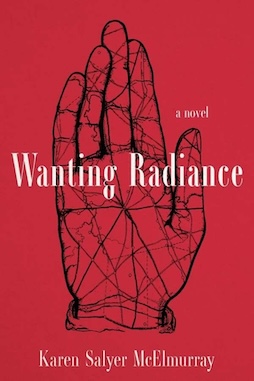According to the University of Alabama’s Institute for Human Rights, in 2018, just two years before Karen Salyer McElmurray’s Wanting Radiance: A Novel was published, the median household income for Appalachia’s twenty-five million residents was $10,000 below the rest of the nation, with most of its young adults, ages 18 to 21, living well below the poverty line. Although the Appalachian region extends from Alabama to Ohio, covering fifteen states in all, its rural communities remain isolated and cutoff from the rest of the country, leaving them blighted by unemployment, lack of medical services and a crumbling infrastructure.
Yet, it is against this dismal, hardscrabble Appalachian landscape that Karen Salyer McElmurray sets her extraordinary story of Miracelle Loving’s heroic quest to unravel the dark mysteries of her origins. Like James Agee’s Let Us Now Praise Famous Men, which unflinchingly portrays in prose and photographs the lives of southern white sharecroppers during the depression, McElmurray’s novel is populated with deeply realized three-dimensional characters in sharp contrast to the hillbilly stereotypes usually depicted in less accomplished books, television and films.
Although Wanting Radiance is narrative fiction at its best, it is also a riveting blend of allegory, memoir, ghost story, murder mystery, romance, tragedy, and odyssey. Just as a country road can often meander for several miles before returning to its starting point, Wanting Radiance follows Miracelle’s convoluted journey as she drifts from one temporary home to another, each move bringing her no closer to finding what she wants. At one point, she wonders,“Is that all that love lacked? Potions and charms. Spells against the world and its highways and byways and all the places I’d been and things I’d done that had never left me satisfied.”
Miracelle is well versed in magic, which she learned from her mother Ruby who supports herself and her daughter by telling fortunes and casting spells as they travel from place to place—a vagabond life that Miracelle adopts after her mother’s tragic death leaves her alone to face the world. Even so, her mother’s ghost is always with her, urging her to continue her lonely quest. “The Ruby singing inside me was hoarse with cigarette smoke and whiskey. Her ghost-self cut decks of cards and told stories about lives not her own. Her feet danced inside my heart, slid sock-footed across one more barroom floor, across the floor of one more kitchen we never called our own.”
The novel’s form unfolds like the creases across someone’s palm. To the untutored, they are meaningless. But to a fortune teller skilled in palmistry, they speak volumes about the future. In the same way, McElmurray traces the backroads of Appalachia as they intersect, weave right or left, and finally reach milestone destinations— forgotten ghost towns like Radiance and Smyte, or small cities like Knoxville—that reveal long buried secrets that have the power to heal as well as destroy.
Weary of her endless journey and the ghosts who travel with her, Miracelle feels trapped in a limbo, “Between now and then, between wanting and having, between what you got and what you wanted so much it tasted bittersweet.”
But readers of this beautifully written novel will savor every mile, every turn in the road, each revelation and heartbreak. The language alone is worth the ride as in this scene describing the moment a woman discovers a fatal flaw in her lover: “She put her hand against his chest and knew there was a miss there, a secret, an enormous misfire that might someday cause this thing that was them to crash and burn, but she had no exact remedies. Surely, she told herself, the weight of the world would be enough.”
Wanting Radiance gives readers a rare glimpse into the emotional lives of those who call Appalachia home, who struggle daily to hold body and soul together, who persevere despite the enormous odds against their abiding hope to find and nurture love or die trying. It is the stuff of ballads and fiddle music under the stars. And appropriately, the novel’s foundation is built on the fragmented lyrics of a country song that ripples throughout its pages: “Love me in the morning, love me at night. Hold me, Radiance, honey, till long past midnight.”
Karen Salyer McElmurray’s Surrendered Child: A Birth Mother’s Journey, was an AWP Award Winner for Creative Nonfiction. Her novels are The Motel of the Stars, Editor’s Pick by Oxford American, and Strange Birds in the Tree of Heaven, winner of the Chaffin Award for Appalachian Writing. Her nonfiction work has been three times Notable in Best American Essays, several times a Pushcart nominee, and a recipient of the Annie Dillard Award for the Essay, the New Southerner Award and the Orison Anthology Award for Creative Nonfiction. She has co-edited, with poet Adrian Blevins, an essay collection called Walk till the Dogs Get Mean. An essay collection called Voice Lessons is currently under contract with Iris Press. McElmurray teaches in the Low Residency Program at West Virginia Wesleyan College and as part-time Associate Professor at Gettysburg College.






